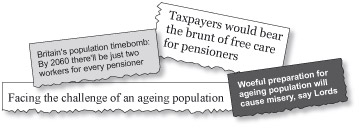Home » Course Layouts » Free Course Layout Udemy
Everyone is aging, whatever their current age and we live in a world where many people are living much longer than previous generations. This is often seen as a problem. But is it? This course, Introducing aging, will help you to think about this issue by introducing you to some key ideas in studying later life.
0
57
English
English [CC]
FREE
- Learn basic syntax that can apply to any language.
- Learn what is a programming language and the basic concepts for beginners.
- Understand what is Javascript in it's truest form.
- Know the basic syntax of Javascript.
- Know some hidden quirks in Javascript.
Description
Introduction
Have you ever thought about how long you might live? In the UK and in many other parts of the world, most people can expect to live longer than their parents and grandparents did. A baby born in 2011 is almost eight times more likely to live to be 100 than one born in 1931 (Department of Work and Pensions, 2011). The World Health Organization estimates that globally the proportion of people aged over 60 will double from 11% in 2000 to 22% in 2050 (WHO, 2012). These big changes can have really significant effects on individuals and on society more widely.
Figure 1
Image showing four headlines as follows: Britain’s population timebomb: By 2060 there’ll be just two workers for every pensioner Facing the challenge of an ageing population Taxpayers would bear the brunt of free care for pensioners Woeful preparation for ageing population will cause misery, say Lords.
Course learning outcomes
After studying this course, you should be able to:- Demonstrate knowledge and understanding of current issues in aging and later life
- Reflect on experiences of aging and later life
- Analyze case studies of care situations, drawing out their wider relevance to concepts and ideas
- Demonstrate developed literacy, numeracy, and digital and information literacy skills.
Course content
-
- Thinking about your own ageing 01:00:00
-
- Introducing Monty Meth 01:00:00
- Introducing ‘the Third Age’ 02:00:00
- What about the Fourth Age? 03:00:00
- Conclusion 00:50:00
N.A
- 5 stars0
- 4 stars0
- 3 stars0
- 2 stars0
- 1 stars0
No Reviews found for this course.
Instructor
Open University UK
4.8
4.8
14
42473
1068
Explore Free Courses
Access valuable knowledge without any cost.
{"title":"","show_title":"0","post_type":"course","taxonomy":"course-cat","term":"engineering-skills,health-and-safety","post_ids":"","course_style":"free","featured_style":"course6","masonry":"","grid_columns":"clear4 col-md-3","column_width":"268","gutter":"30","grid_number":"4","infinite":"","pagination":"","grid_excerpt_length":"20","grid_link":"1","grid_search":"0","course_type":"","css_class":"","container_css":"","custom_css":""}












